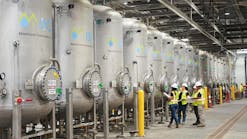Brown and Caldwell receives funding grant for PFAS incineration study
WALNUT CREEK, CA -- Brown and Caldwell has been granted funding from The Water Research Foundation (WRF) to study the fate of per- and polyfluoroalkyl substances (PFAS) through sewage sludge incineration.
PFAS is a group of human-made chemicals found in a range of consumer and industrial products. Many PFAS are resistant to grease, oil, water, and heat and used in many applications, including stain- and water-resistant fabrics and carpeting, cleaning products, paints, and fire-fighting foams. The widespread use of PFAS and their ability to remain intact in the environment over time can result in environmental contamination.
PFAS – deemed as “forever chemicals” – are present in discharges to wastewater systems, and because of their characteristics, undergo virtually no degradation before environmental discharge. Thermal treatment of PFAS-laden wastewater solids through sewage sludge incinerators (SSIs) offers a potential PFAS control strategy; however, with few published research studies available, the ability of SSIs to fully mineralize PFAS is unknown.
To this end, a research team led by co-principal investigators Lloyd Winchell (Brown and Caldwell) and Dr. Detlef Knappe (North Carolina State University) has been awarded a $100,000 grant from WRF through its Tailored Collaboration Program to support utility-specific/regional issues. The study aims to explain the fate of PFAS compounds through SSIs and provide utilities with an indication of the extent to which SSIs can eliminate or reduce PFAS emissions. The team includes chemists, PFAS specialists, and thermal processing experts from 10 utility partners and one trade organization. One supporting partner is The City of Cedar Rapids, mindful of its role in understanding PFAS at its Water Pollution Control Facility:
“The City is excited to support this opportunity to further our commitment to environmental stewardship and the protection of human health,” said Cedar Rapids City Manager Jeff Pomeranz. “With this research in hand, we and other utilities can responsibly progress with facility designs that account for PFAS entering our systems.”
Aspects of the study include identifying municipal water resource recovery test sites with different technologies to combust solids captured from the treatment process. Once collected, samples will be analyzed, and a research report prepared to help utilities inform their assessment of appropriate PFAS handling strategies.
The recently commenced study is scheduled for completion within 18 months. Collection and sample analyses are expected by the end of 2021. The report will be finalized within six months of receiving test data.




